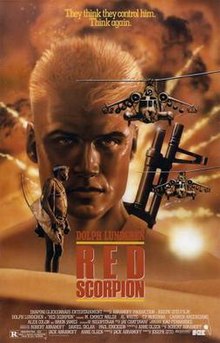Red Scorpion
| Red Scorpion | |
|---|---|

Theatrical release poster
|
|
| Directed by | Joseph Zito |
| Produced by | Jack Abramoff |
| Written by |
|
| Starring | |
| Music by | Jay Chattaway |
| Cinematography | João Fernandes |
| Edited by | Daniel Loewenthal |
|
Production
company |
Abramoff Productions
|
| Distributed by |
|
|
Release date
|
|
|
Running time
|
105 minutes |
| Country | United States |
| Language | English |
| Box office | $4.2 million (US) |
Red Scorpion is a 1988 American action film starring Dolph Lundgren and directed by Joseph Zito. The film was released in the US on April 21, 1989.
Nikolai Petrovitch Rachenko, a Soviet Spetsnaz operative is sent to an African country where Soviet, Czechoslovakian and Cuban forces are helping the government fight an anti-communist rebel movement. He is tasked with the mission to assassinate the rebel leader. In order to infiltrate the rebel movement and get within striking distance of his target, he stirs up trouble in the local bar and gets arrested for disorderly conduct. He is put in the same cell as a captured resistance commander and gains his trust in facilitating the escape. Upon finally reaching the rebel encampment he is met with distrust by the rebels. During the night he attempts to assassinate his target but does not succeed when the distrustful rebels anticipate his actions.
Disgraced and tortured by his commanding officers for failing his mission, he breaks out of the interrogation chamber and escapes to the desert, later to be found by native bushmen. He soon learns about them and their culture, and after receiving a ceremonial burn scar in the form of a scorpion (hence the title), he rejoins the freedom fighters and leads an attack against the Soviet camp after a previous attack on the peaceful bushmen. Nikolai obtains an AO-63 from the armory, confronts his corrupt officers and hunts down General Vortek, who attempts to escape in a Mil-24 Hind only to be shot down after takeoff. Nikolai defeats and kills Vortek, as the freedom fighters finally defeat the Soviet oppression.
After being denied the right from filming in Swaziland and a search for other locations, the film was made in Namibia (then South-West Africa). Warner Bros., who had a negative pickup deal to release the picture, pulled out for the breach of their contract with the production. Artists and Athletes Against Apartheid then condemned the production for breaking the international boycott against South Africa. The film allegedly received help from the South African government as part of its propaganda efforts to undermine international sympathy for the African National Congress (see International Freedom Foundation).
...
Wikipedia
